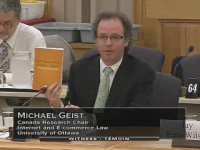The Federal Court of Canada has issued an important decision involving copyright and posting content online. The case involves a lawsuit launched by Richard Warman and the National Post against Mark and Constance Fournier, who run the FreeDominion website. Warman and the National Post sued the site over the appearance of two articles and an inline link to photograph that appeared on the forum. The court dismissed all three claims.
While the first claim (Warman’s article) was dismissed on the basis that it took too long to file the lawsuit, the legal analysis on the National Post claim involving an article by Jonathan Kay assesses the copyright implications of posting several paragraphs from an article online. In this case, the article was 11 paragraphs long. The reproduction on the Free Dominion site included the headline, three complete paragraphs and part of a fourth. The court ruled that this amount of copying did not constitute a “substantial part” of the work and therefore there was no infringement. The court added that in the alternative, the reproduction of the work was covered by fair dealing, concluding that a large and liberal interpretation of news reporting would include posts to the discussion forum. The decision then includes an analysis of the six factor test and concludes that the use was fair.








